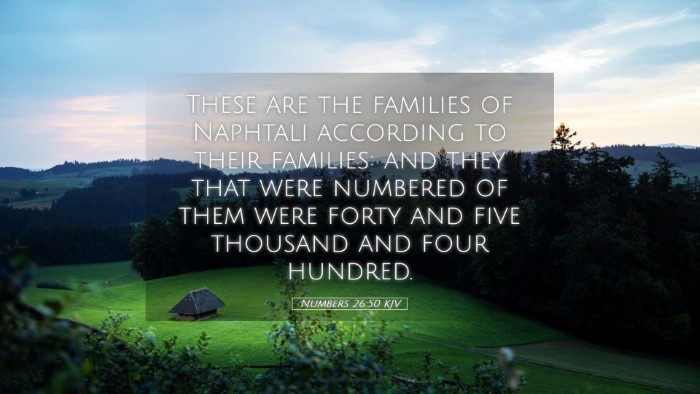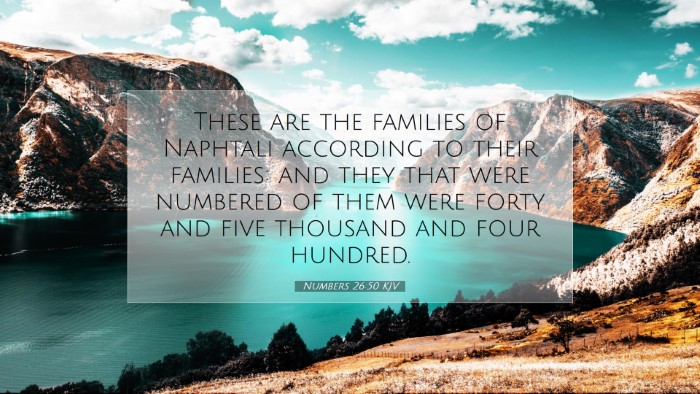Commentary on Numbers 26:50
Numbers 26:50 states: “These are the families of the children of Manasseh:
and those that were numbered of them were fifty and two thousand and seven hundred.”
In this verse, we witness an essential moment in the life of the Israelites as they prepare
to enter the Promised Land. The census taken by Moses offers profound insights into the
divine order, the significance of family, and the unfolding of God’s promises.
General Context
The Book of Numbers, written by Moses, serves as a record of Israel's wanderings in the desert
and the preparation of the Israelites to receive their inheritance in Canaan. The second
census in this chapter follows the first census recorded in Numbers 1, which was conducted in
the Wilderness of Sinai nearly 40 years earlier.
Insights from Commentators
Matthew Henry's Commentary
Matthew Henry emphasizes the importance of this enumeration in terms of God's faithfulness
to His people. He states that each family is carefully counted, signifying the value of
each individual in the eyes of God. Henry points out that the tribe of Manasseh, which is
significant in the history of Israel, is noted here specifically for its size and significance.
- God's Providence: Every person counted means that God will not abandon
His promises; He meticulously watches over His people.
- Fulfillment of Promises: God had promised Abraham that his descendants
would be as numerous as the stars, and here is evidence of that promise being fulfilled.
Albert Barnes' Notes on the Bible
Albert Barnes highlights the modifications in the population since the first census, indicating
both growth and the consequences of sin (as some of the original generation perished in
the wilderness). He notes that the numbers serve as a reminder of both God's judgment and
His mercy, as there remains a faithful remnant among the people.
- Significance of Numbers: Numbers denote organization and accountability,
reflecting a disciplined community.
- Importance of Lineage: The mention of families underlines the patriarchal
system of the Israelites; lineage was critical in understanding one’s inheritance.
Adam Clarke's Commentary
Adam Clarke offers a theological perspective on the significance of the tribe of Manasseh.
He mentions that Manasseh, being a half-tribe, had a unique position among the Israelites.
Their inclusion in this census brings attention to the allocation of land and God's providence
in distributing inheritance among the tribes.
- Theological Implications: The differing sizes of tribes entered into
the Promised Land highlight the varying experiences of God’s people and the intricate
workings of divine providence.
- Inclusiveness of God’s Plan: Despite being a “half-tribe,” Manasseh is
included fully in God's promise, showcasing the inclusivity of God’s covenant.
Application for Modern Believers
This passage, while historical, imparts vital truths applicable in the contemporary context.
For pastors, students, theologians, and scholars, the essence of Numbers 26:50 can be
explored in terms of community, identity, and the faithfulness of God through generations.
Community and Identity
The counting reflects the communal identity that is central to the people of God. In modern
church life, understanding one’s identity within the body of Christ is crucial. Each member
contributes to the whole, demonstrating that every individual matters.
God’s Faithfulness
The idea of God keeping a record of His people, as illustrated in this census, invites
believers to trust in His continual faithfulness. Just as He watched over Israel, He keeps
His promises to us today, providing encouragement in God’s providential care through trials,
judgment, and mercy.
Preparation and Inheritance
Just as the tribe of Manasseh was prepared to claim their inheritance in the land, so too are
believers encouraged to prepare for their spiritual inheritance. This preparation involves
active faith, community engagement, and spiritual discipline as we strive to fulfill God’s purpose in our lives.
Conclusion
Numbers 26:50 serves as a reminder of God’s unchanging character and His promises throughout
generations. By studying the insights from various commentators, we gain a richer understanding
of the text and its significance for both ancient Israel and the modern believer. Each word is
a testament to God’s meticulous care for His people and a call to recognize our place within
His grand narrative.


